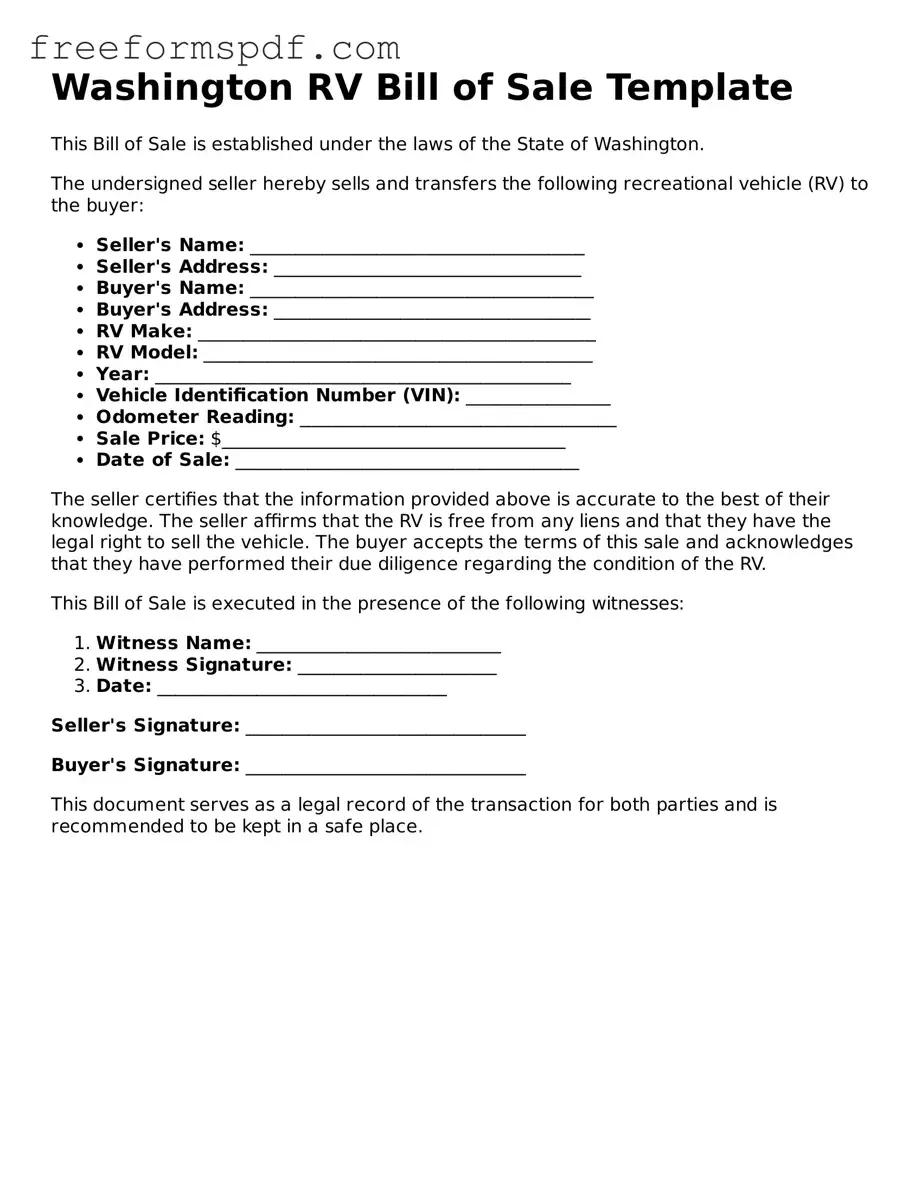Attorney-Verified RV Bill of Sale Document for Washington State
Common mistakes
-
Incomplete Information: Many people fail to fill out all required fields on the form. This includes the names of both the buyer and seller, the RV identification number, and the sale price. Leaving out even one detail can lead to complications later.
-
Incorrect VIN: The Vehicle Identification Number (VIN) must be accurate. A small typo can cause significant issues when registering the RV. Double-check the VIN against the title or registration documents.
-
Not Notarizing the Document: In Washington, notarization is often recommended, though not always required. Failing to have the bill of sale notarized can create challenges in proving ownership during future transactions.
-
Neglecting to Keep Copies: After completing the form, some individuals forget to make copies for their records. Keeping a copy protects both the buyer and seller in case any disputes arise later on.
Learn More on This Form
-
What is a Washington RV Bill of Sale?
A Washington RV Bill of Sale is a legal document that records the sale and transfer of ownership of a recreational vehicle (RV) between a seller and a buyer. This document serves as proof of the transaction and includes essential details such as the names and addresses of both parties, a description of the RV, the sale price, and the date of the sale.
-
Why is a Bill of Sale necessary?
Having a Bill of Sale is important for several reasons. First, it provides legal protection for both the buyer and the seller by documenting the terms of the sale. This can help prevent disputes over ownership or payment in the future. Additionally, the Bill of Sale is often required when registering the RV with the Department of Licensing, ensuring that the new owner can legally operate the vehicle.
-
What information is required on the form?
The Washington RV Bill of Sale must include specific information to be valid. Key details include:
- The full names and addresses of both the buyer and the seller.
- A detailed description of the RV, including the make, model, year, and Vehicle Identification Number (VIN).
- The sale price of the RV.
- The date of the transaction.
- Any warranties or conditions of the sale, if applicable.
-
Do I need to have the Bill of Sale notarized?
While notarization is not a strict requirement for a Washington RV Bill of Sale, it is highly recommended. Having the document notarized adds an extra layer of authenticity and can help prevent any potential disputes regarding the sale. It also provides assurance to both parties that the transaction was conducted fairly and legally.
-
Can I use a generic Bill of Sale template?
Yes, you can use a generic Bill of Sale template, but it is advisable to ensure that it meets the specific requirements of Washington State. Customizing the template to include all necessary details related to the RV and the transaction is essential. This helps ensure that the document serves its intended purpose and is legally binding.
-
What should I do after completing the Bill of Sale?
After completing the Bill of Sale, both the buyer and seller should keep a copy for their records. The buyer should take the signed document to the Department of Licensing to register the RV in their name. It is also wise to check if any additional paperwork or fees are required for registration, ensuring a smooth transition of ownership.
Misconceptions
The Washington RV Bill of Sale form is a crucial document for anyone buying or selling a recreational vehicle in the state of Washington. However, several misconceptions about this form can lead to confusion. Here are six common misconceptions:
- 1. The RV Bill of Sale is not required for all transactions. Many people believe that a bill of sale is optional. In Washington, it is recommended for all RV sales to protect both the buyer and seller.
- 2. A verbal agreement suffices. Some individuals think that a verbal agreement is enough to finalize the sale. However, having a written bill of sale provides legal proof of the transaction.
- 3. The form must be notarized. There is a belief that the RV Bill of Sale must be notarized to be valid. While notarization can add an extra layer of authenticity, it is not a requirement in Washington.
- 4. Only the seller needs to sign the form. Some people assume that only the seller's signature is necessary. Both the buyer and seller should sign the bill of sale to ensure it is legally binding.
- 5. The form is only for private sales. There is a misconception that the RV Bill of Sale is only applicable for private transactions. In reality, it is also useful for sales through dealerships and other businesses.
- 6. The form does not need to include specific details. Some individuals think that a simple statement of sale is enough. The bill of sale should include detailed information about the RV, such as the VIN, make, model, and sale price to be effective.
Understanding these misconceptions can help ensure that the process of buying or selling an RV in Washington goes smoothly and legally.
Some Other RV Bill of Sale State Templates
Texas Department of Motor Vehicles - Including a description of any defects or issues in the RV can protect the seller from liability.
Understanding the intricacies of retirement options is essential for EMT members, which is why the NY Templates for the NYCERS F170 form can be an invaluable resource. This form not only facilitates the enrollment process but also ensures that members make informed decisions regarding their retirement benefits.
